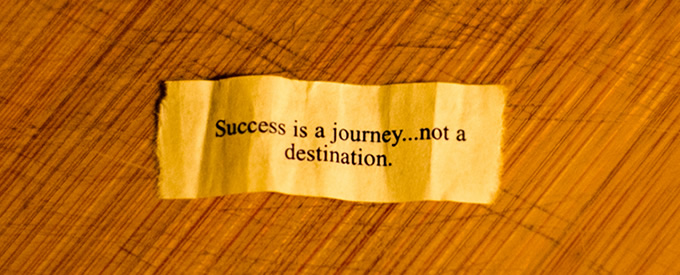
What does success mean?
My great-grandmother was a modern woman. She led a butchery together with my great-grandfather while also raising their four children. The workload was so massive that she started to take sleeping pills to be able to fall asleep at night and stimulant pills in the morning to be capable of waking up and cope with all the work. At some point, she became addicted. The doctor told her, he could only prescribe her more pills if she agreed to be added to the local register of drug-addicted people. She couldn’t stand the thought of people in her village talking behind her back that she was “a drug addict” so she told the doctor, she won’t need them anymore. She stopped taking the pills.
When my mom told me this story I was a teenager and I could fully identify myself with this woman with an incredible will power. I took pride in being able to achieve whatever goal I set myself. I graduated every school year with only the best grade in every single subject, I was the best in PE (we got points for every lap we ran) and was one of the best of our school’s ski racing team. I succeeded in everything I wanted apart from getting my driving licence. This continued at university – I was one of the best in class, although travelling through Europe a lot, did prestigious internships and was awarded scholarships to study abroad. Optimizing and success were among by biggest virtues.
However, during those years those virtues were challenged, because “life is what happens while you are busy making other plans”. The following are two examples of occasions that made me question my perspective on success.
First, in analogy to what my dad always says: “Be careful what you wish for”, I could translate that to “be careful what you work for”. Is that goal I worked for actually really what I wanted? Did I even know how that goal looked like in practice, once I reached it? An example is research. The goal of becoming an astronomer was everything I had ever worked for. Towards the end of my Master I faced an identity crisis, because I realised that science is different to the romantic image we are taught (you can find the whole story here). I was back to square one. Who am I and what do I want? I faced an identity crisis.
Second, I learned the really hard way that not everything was in my control. I took pride in my ability to “make the impossible possible” with an immense willpower and an uncrushable persistence. However, over all those years, I didn’t realise that I had been connecting my identity to the outcome. I had started to believe that it was only up to me whether I can succeed or not. In other words, failing would hurt my ego so badly, that I just couldn’t afford to give up. One of the things that hurt me most were rejections. Especially when I experienced a great chemistry and connection with a guy, and yet they decided against a relationship with me. I took these rejections very personal, because of my nagging background feeling that I wasn’t enough. Whereas in fact, sometimes love is not enough for a relationship to work. Sometimes, factors like the right timing and readiness of both people are equally important. I had to learn that the really hard way, since that was difficult to understand for my rational mind.
Since then I have come a long way already in the process of redefining what success means to me. I don’t define it anymore according to whether I achieve what I wanted when I started planning, but instead I try to be open to what life brings to me. I try not to approach situations with my ego anymore, which would say “I can do it, no matter what”. Rather I try to face them with a feeling of self-worth, which sounds more like “This is important to me, and I’m going to do my best … but it doesn’t define me.” Sometimes it is hard to find that balance though, and to know when I did my best. These are some questions I keep reminding myself of when things seem important to me and I want to succeed:
First, I ask myself “Is this really what I want?” Or is what I want based on my upbringing and mostly my parent’s or other people’s values of what is good or bad? It might be a life-long process of figuring out what is me, so that #Icanbeme. There is nobody that can tell me what I really want, so I need to trust my inner voice.
Second, while willpower is one of my biggest strengths, on the other side of that coin, acceptance is one of my biggest weaknesses. When do I fight and when do I flight? When do I know that I have fought enough? When do I know there is nothing in my capacity anymore that would change the situation and it would be better to give up? On that note, I will end this post with the “serenity prayer” as it summarises that struggle very well:
“[…] grant me the serenity to accept the things I cannot change,
– Serenity Prayer
the courage to change the things I can,
and the wisdom to know the difference.”
Written by Julia Heuritsch | Last edited: 8th June 2022